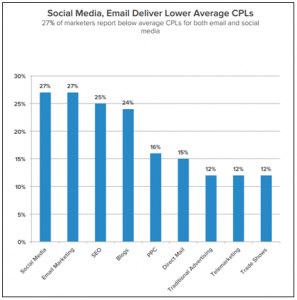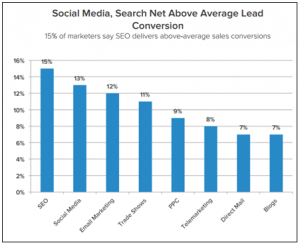
A lot of marketing tactics today focus on Digital Advertising and Inbound Marketing, which are both online. The polar opposite of face-to-face. But don’t be sold on the idea that offline marketing is dying because it’s not.
Online Marketing
Pros
Cost effective. Online social media and inbound marketing tactics are proven to have lower average costs per leads, according to Hubspot’s 2013 State of Inbound Marketing Report.
More options. It can range from video to images to email to blogs. You won’t be limited to the type of content that one group of people enjoy.
Better analytics and easier tracking. There is an endless amount of marketing automation tools you can use to track, analyze, and act upon. Here’s just a few.
Instant results. You can see conversions in a matter of minutes. If you’ve got a good campaign and marketing efforts, profit will come in effortlessly. Hubspot lets the data do all the talking, and shows us that social media equates to a higher lead coversion.
Create a better customer experience. If you can track and automate your process for a personalized experience, you can make it so much better for the customer.
Reach a targeted audience. All that data at the tips of your fingers? More of a reason to personalize and target just the right people!
Available 24/7. No more concerns for international consumers or after-hour messages. Your ads will be shown at any and every time of the day.
Cons
Less customer urgency. People can choose to ignore your ads if you don’t make it count.
Marketing campaigns can be copied. I’m sure we’re all guilty of it at one point or another in our marketing lives. Free stock images (thank you, Unsplash!), free social media, and so on. You name it; it’s out there and everyone uses it.
Too much noise and clutter. Because there’s a low barrier to entry, super easy, and pretty cheap, there’s nothing really stopping anyone from adding to the sea of content. It’s hard to get above all those voices.
Potentially damaging to your reputation. One wrong step and depending on how you handle it, it can land a detrimental hit to your image.
A lot of competition. Anyone and everyone can do it. Your enemy? Anyone and everyone (in your industry).
Harder to manage and keep up-to-date. There are so many tools, so how do you know which one to use? All of them? Some of them? Then there’s marketing automation and other technology. It can seem pretty daunting at first.
Very dependent on technology. The very definition of “online” is to be “controlled by a computer or network.” If your team isn’t well-versed in computers and networks, it can be intimidating at first.
Targets the younger audience. Internet fanatics stem from a younger generation. If your business caters to an older group of people, it may be harder to reach them digitally (though not impossible).
Examples
- Blogs
- Videos
- Social Networking
- Online ads
- Affiliates
Offline Marketing
Pros
Marketing diversity. The internet is just one place – albeit a very large one, but still one place. Offline allows you to travel with the customer everywhere: on the radio, when they’re walking, in local restaurants, at events, and so on.
More networking opportunities. Marketing isn’t just about being friends with your customers; it’s about making friends with other businesses. Going to offline events will help you meet other professionals in your industry and learn a thing or two from them.
Personal, face-to-face interactions. The best type of customer service is making people happy while getting to know them in person. Relationships tend to last longer because of the personalized experience.
Tons of options. Press, radio, TV, bus ads, flyers in schools and local businesses, sponsorships, partnerships. The list is endless.
Give them a real experience. People buy experiences. You can have an amazing product, but if the purchase experience is less than stellar, chances are they’ll move to a competitor. A real experience will leave a longer lasting impression.
More engagement. With online marketing comes a lot of noise. It seems distant and wait times are sometimes long. Offline marketing through tradeshows, conventions, and speaking events make it easier for customers to engage with you and your business.
Cons
More expensive. If you want space in a newspaper ad or get flyers printed, there will always be costs. It’s not as cheap as hopping onto your computer and posting a quick hello on Twitter.
Harder to target. It might get seen, but maybe not seen by the people you want. Different types of people will be at different places at different types, and you can’t really tell your ad to be there during those times.
Might come off as forced and interruptive. I’m sure you’ve experienced it – you’re listening to the radio and ads come on during breaks. May not be the best moment of the person’s life.
Lack of a community. Unlike online, there’s no place to build a set of relationships with many people at once. It’s a one-time go or one-way conversation.
Can be portrayed as “pitchy.” Offline and in-person interactions means you have less time to sell your idea and brand. That feeling of needing to rush can be obvious to the consumer. We forget to think about the customer at times and only think about revenue.
Examples
- Catalogues
- Brochures
- Flyers
- Exhibitions
- Newspaper ads
- Tradeshows
Proof it Works
You might be thinking: well, why not just stick with online and digital marketing since that’s what most people do nowadays? Yes, but the goal of marketing is speaking to all the right people, not just the ones who are convenient and cheap. Sometimes, going the extra mile will rake in more profit because you took more effort to build your brand across all platforms.
Ready to see the numbers that prove that offline is still good?
- Only 40% of the world population has access to the internet. Of that, only 21.8% of those users are from North & South America.
- Buyers come with 57% more preparation about the purchase before coming to salespeople. That means you can leverage the other 33% that they haven’t researched and bring them something they don’t know.
- 56% of all direct mail is opened. Mail is not obsolete!
- After a presentation, 63% of attendees remember the story you give, not the statistics. Leave a lasting impression.
- Real-time advertising opportunities like presentations, tradeshows, or in-person interactions account for 2x more likely interactions between you and the customer.
Offline advertising isn’t dead. It just needs to be supplemented by online advertising. A lot of things are going digital, but it doesn’t make traditional marketing completely eradicated.
Next up: Which Social Media and Blogs You Should Use
This is a blog series outlining the details of the 6 principles of Engagement Marketing: VAIRCG.



